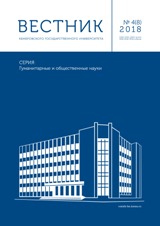Russian Federation
The empirical study featured the psychological characteristics of people who committed crimes of violence, namely murders and rapes. The paper describes the distinctive features of such criminals, as well as the peculiarities of the mechanisms of their psychological defense, which manifested themselves during interrogations as at the stage of preliminary investigation. Repression (displacement of reality), projection, rationalization, and identification with the aggressor were the most common mechanisms of psychological defense among killers. As for rapists, it was rationalization. The awareness about the features of the psychological defense used by violent criminals can help to develop the tactics of neutralization and overcome counteraction during interrogations on the basis of reflexive control. The research results can be used to improve the tactics of interrogation of suspects and defendants in cases of violent crimes.
violent criminal, tactics of interrogation, overcoming of counteraction, psychological defense, reflection, reflexive control
1. Enikeev M. I. Iuridicheskaia psikhologiia. S osnovami obshchei i sotsialʹnoi psikhologii [Legal psychology. With the basics of general and social psychology]. Moscow: Norma, 2005, 640.
2. Shigabetdinova G. M. Fenomen refleksii: granitsy poniatiia [Phenomenon of reflection: the boundaries of the concept]. Vestnik Nizhegorodskogo universiteta im. N. I. Lobachevskogo = Vestnik of Lobachevsky University of Nizhni Novgorod, no. 2-1 (2014): 415-422.
3. Noskov V. A. Psikhotekhnika obshcheniia [Psychotechnics communication]. Moscow: IMTS GUK MVD Rossii, 2001, 120.
4. Slovarʹ prakticheskogo psikhologa [Dictionary of practical psychologist]. Comp. Golovin S. Iu. Minsk: Kharvest; Moscow: AST, 2001, 808.
5. Usmanov U. A. Taktika doprosa na predvaritelʹnom sledstvii [Tactics of interrogation at the preliminary investigation]. Moscow: PRIOR, 2001, 174.
6. Zorin G. A. Rukovodstvo po taktike doprosa [Interrogation Tactics Guide]. Moscow: Iurlitinform, 2001, 320.
7. Rukovodstvo dlia gosudarstvennykh obvinitelei: kriminalisticheskii aspekt deiatelʹnosti [Guide for public prosecutors: forensic aspect of activity]. Ed. Korshunova O. N. Saint-Petersburg: Iuridicheskii tsentr Press, 2003, 688.
8. Obraztsov V. A. Kriminalistika: modeli sredstv i tekhnologii raskrytiia prestuplenii [Forensic science: models of tools and technologies for solving crimes: lectures]. Moscow: IMPE-PABLISH, 2004, 397.
9. Zorin G. A. Ispolʹzovanie kriminalisticheskikh igr, inversii, effektov i takticheskikh lovushek pri rassledovanii, obvinenii i zashchite po ugolovnym delam [Use of forensic games, inversions, effects, and tactical traps in the investigation, prosecution, and defense in criminal cases]. Moscow: Iurlitinform, 2002, 360.
10. Alymov D. V. Teoreticheskie i prakticheskie aspekty ispolʹzovaniia taktiko-kriminalisticheskikh algoritmov v rassledovanii prestuplenii [Theoretical and practical aspects of using tactical and forensic algorithms in investigation of crimes]. Biblioteka kriminalista. Nauchnyi zhurnal = Forensic library. Science Magazine, no. 2 (2017): 182-192.
11. Zinevich O. Ia, Simbiryova Ia. A. Problemy i osnovnye aspekty izucheniia lichnosti prestupnika [Problems and aspects of studying criminal personality]. Uchenye zapiski Krymskogo federalʹnogo universiteta imeni V. I. Vernadskogo. Iuridicheskie nauki = Scientific notes of the Crimean Federal University named after V. I. Vernadsky. Jurisprudence, 3, no. 3 (2017): 118-123.
12. Trush V. M. Osobennosti vliianiia mekhanizmov psikhologicheskoi zashchity na formirovanie kriminogennoi zarazhennosti prestupnikov [Features of the influence of psychological defense mechanisms on the formation of criminogenic infection of criminals]. Aktualʹnye problemy gumanitarnykh i estestvennykh nauk = Actual problems of the humanities and natural sciences, no. 1-2 (2014): 229-237.
13. Kitaev N. N. Postkriminalʹnyi suitsid ubiits kak ulika povedeniia [Post-criminal suicide of murderers as evidence of behavior]. Sotsialʹno-ekonomicheskie i pravovye problemy Vostochno-Sibirskogo regiona na poroge tretʹego tysiacheletiia: materialy nauch.-prakt. konf. (13-17 maia 1998 g.) [Socio-economic and legal problems of the East-Siberian region on the threshold of the third millennium: Proc. Sci.-Prac. Conf. (May 13-17, 1998)]. Irkutsk, 1998, 70-72.
14. Ratinov A. R. Sudebnaia psikhologiia dlia sledovatelei [Forensic psychology for investigators]. Moscow: Iurlitinform, 2001, 352.
15. Kirshbaum E. I., Eremeeva A. I. Psikhologicheskaia zashchita [Psychological protection]. Saint-Petersburg: Smysl, Piter, 2005, 86.
16. Polstovalov O. V. Kriminalisticheskaia konfliktologiia: sovremennye nravstvennye i psikhologicheskie problemy [Forensic conflictology: modern moral and psychological problems]. Ufa: RIO BashGU, 2002, 152.
17. Lozhkin A. I. Psikhologiia lichnosti agressivno-nasilʹstvennogo prestupnika (motivatsionno-smyslovoi aspekt). Avtoref. diss. kand. psikhol. nauk [The psychology of the personality of an aggressively violent criminal (motivational and semantic aspect). Cand. Psychol. Sci. Diss. Abstr.]. Moscow, 2000, 23.
18. Antonian Iu. M., Tkachenko A. A., Shostakovich B. V. Kriminalʹnaia seksologiia [Criminal sexology]. Moscow: Spark, 1999, 464.


















